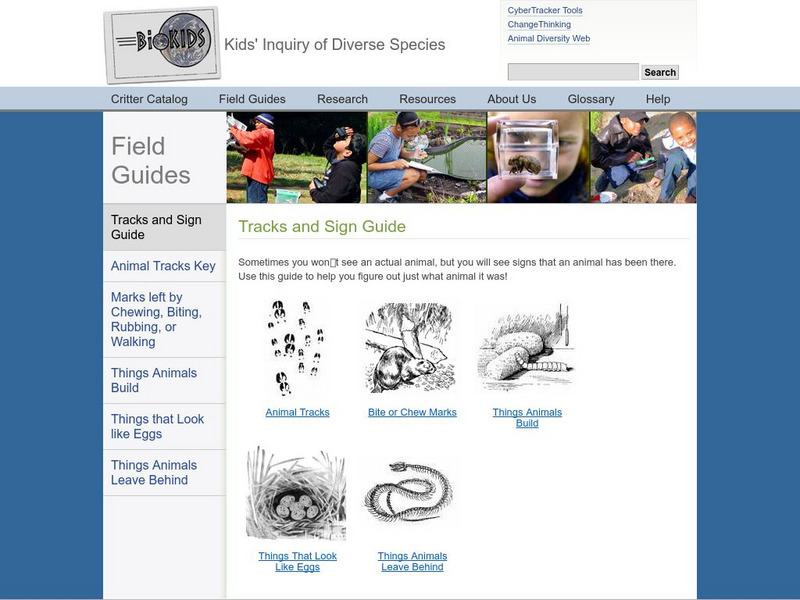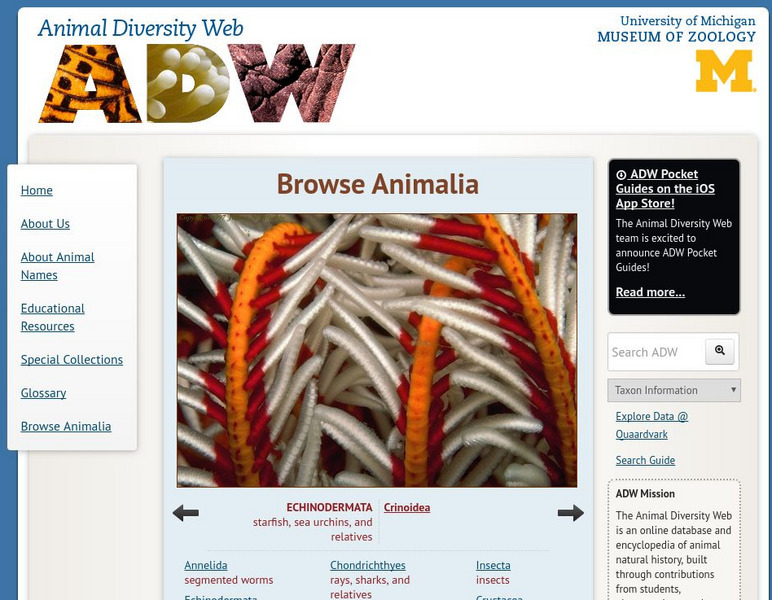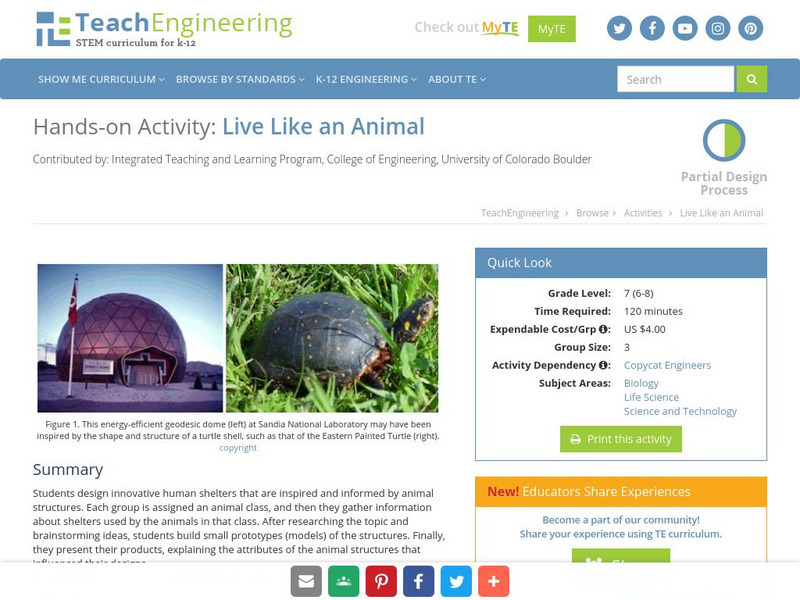Tree of Life Project
The Tree of Life Web Project: Animals
Extensive site that contains much information about the various animal phyla. Each phyla gives photos, common examples, scientific names and references. Collection of 1630 websites about bio-diversity.
Indiana University
Is Classification Arbitrary or Not?
Students transition from classifying furniture to an understanding of classification of living organisms in this thorough lesson plan site.
Other
It's All About What's Inside. Classification and the Tree of Life [Pdf]
In this science lesson, middle schoolers look at how animals have traditionally been classified in a tree of life diagram by examining the characteristics of plastic eggs. They then analyze the genetic code assigned for each egg and look...
Untamed Science
Untamed Science: Biodiversity: Animals: Invertebrates
See all the of the different animal phyla that represent invertebrates and how diverse they are with the help of short video clips.
ArtsNow
Arts Now Learning: Magic Rocks [Pdf]
In this lesson, students work in groups with each acting as a predator, prey, or family member in a particular habitat. They present their habitat performance to the class and students identify the habitat and animal relationships. Then,...
University of Michigan
University of Michigan: Animal Sign Guide
Use this guide to help you identify signs from different animals in the wilderness. Identify tracks, chew marks, signs from animals that build, eggs, and the like.
Untamed Science
Untamed Science: Biodiversity: Animals: Kingdom Animalia
Learn about the characteristics that make Kingdom Animalia a distinct classification group. Explore photos and watch video clips about many species of animals.
Regents of the University of Michigan
Animal Diversity Web: Museum of Zoology: Animal Diversity Web
This resource contains thousands of descriptions about individual animal species. Many of these descriptions also includes pictures, movies, audio clips, and more.
CK-12 Foundation
Ck 12: Episd: Animal Characteristics
[Free Registration/Login may be required to access all resource tools.] Students will be able to identify and classify organisms that are animals based on recognition of traits presented.
Georgia Department of Education
Ga Virtual Learning: Biology: Animals
Through video clips. informational text, interactive activities, and assessment opportunities, students study and learn about the classification of animals.
TeachEngineering
Teach Engineering: Live Like an Animal
In this activity, students design an innovative human shelter that is inspired and informed by an animal structure. Each group is assigned an animal class, and they gather information about shelters used by the animals in that class....
Sea World Parks & Entertainment
Sea World: Animal Information Database
Sea World's site featuring a variety of information about their animals, as well as general animal information. Includes "Animal Bytes," a list of animals with some of their characteristics. Also includes some games and teacher resources.
University of Illinois
University of Illinois Extension: Urban Text: Adventures of Herman the Worm
WORMS- What are they? Where did they come from? If you are interested in Herman the Worm's family tree (biologically speaking), his body structures, or all the facts about him that you'll ever need, go to "The Adventures of Herman the...
Utah Education Network
Uen: Why Do You Classify This?
Group pictures of animals into similar groups to practice classification.
Utah Education Network
Uen: Classifying Kids
Classification activity relating to plants and animals.
Other
Illinois Wesleyan University: Tardigrade Species Distribution Project
This was a research project on tardigrades that took place some time ago. The site contains information about the project and about tardigrades, including their taxonomy and a glossary. As this is an older site, the links to the...
Utah Education Network
Uen: Keys and Classifying
Sort and classify an assortment of objects relating to classifying Utah plants and animals.
BBC
Bbc: Earth: Tardigrades Return From the Dead
Tardigrades are ancient, fascinating creatures that can survive conditions that would kill most life forms, including extreme heat and absolute zero, extreme pressure and a vacuum, and deadly radiation. They can even survive being...
Other
Mcsuk: Seas Fit for Life
In this thorough site, you will find lots of teacher resources including marine environmental issues.
Other
Science4 Us: Animals
In online and offline activities, students broaden their understanding of animals by learning to identify and classify animals into six categories: mammals, birds, fish, amphibians, reptiles, and invertebrates.
American Museum of Natural History
American Museum of Natural History: O Logy: Meet the Zooarchae O Logist
An interview with Sandra Olsen, a zooarchaeologist studying the history of horses in Kazakhstan. Discover what zooarchaeologists work on in the interview.
Natural History Museum
Natural History Museum: Reptiles, Amphibians and Fishes
This online exhibit from the Natural History Museum branches out in many fields to cover the broad topics of reptiles, amphibians and fishes. Thirteen subtopics are provided including several videos and informative articles.
PBS
Nh Pbs: Nature Works: American Black Bear
Learn more about the American Black Bear through this informative resource. Gain a new perspective of this mighty animal when you learn more about its' habitat, behavior, characteristics, and more.
PBS
Pbs: Mathline Creature Feature Lesson Plan [Pdf]
An interdisciplinary math, science, and language arts instructional activity that engages students in an exploration of statistics. Through a study of various forest climates, students utilize data collection and analysis,...
Other popular searches
- Plant Animal Classification
- Animal Classification System
- Animal Taxonomy Game
- Animal Classification Test
- Animal Classification Fish
- Animal Classification Units
- Classifying Animals Chart
- Diversity of Animal Kingdom
- Animal Classification Lesson
- Classifying Animal Groups
- 5e Animal Classification
- Science Classifying Animals


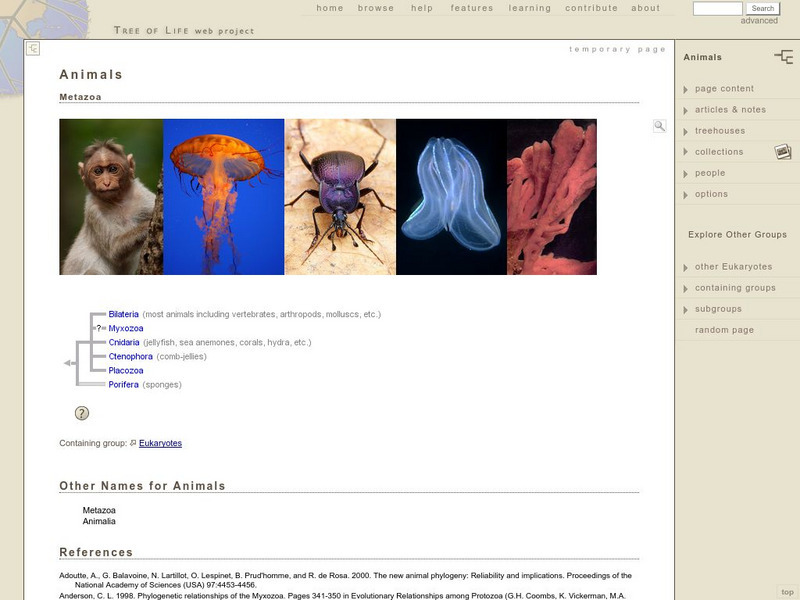
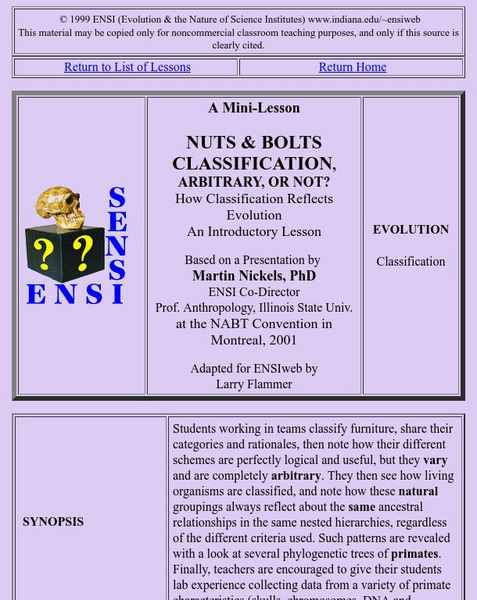
![It's All About What's Inside. Classification and the Tree of Life [Pdf] Lesson Plan It's All About What's Inside. Classification and the Tree of Life [Pdf] Lesson Plan](https://d15y2dacu3jp90.cloudfront.net/images/attachment_defaults/resource/large/FPO-knovation.png)

